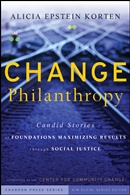 Writing papers to change policies doesn’t work unless change is already happening − this is just one of scores of anecdotes from a book describing the real-life experiences of ten American foundations pursuing social justice. The stories focus on issues such as raising the living wage, increasing funding for public schools, helping the emergence of democratic non-profits, developing socially responsible investing, building the infrastructure of community organizing, developing women’s organizations, and helping to organize immigrant communities.
Writing papers to change policies doesn’t work unless change is already happening − this is just one of scores of anecdotes from a book describing the real-life experiences of ten American foundations pursuing social justice. The stories focus on issues such as raising the living wage, increasing funding for public schools, helping the emergence of democratic non-profits, developing socially responsible investing, building the infrastructure of community organizing, developing women’s organizations, and helping to organize immigrant communities.
The foundations concerned are the Needmor Fund, the Open Society Institute, Global Fund for Women, the Gulf Coast Fund for Community Renewal and Ecological Health, and the Discount, Schott, Ford, Liberty Hill, Charles Stewart Mott and Jacobs Family Foundations. A separate chapter attempts to draw lessons for foundations wishing to develop programmes for social justice.
The narratives are engaging. They are detailed, frank, and sometimes funny. This is life on the inside, and the result is a far cry from the glowing annual report or the abstract evaluation. The stories engage with the messy and turbulent world of development, and show how easy it is to be thrown off course. Strategic planning manuals assume a linear trajectory, and rarely deal with day-to-day life where ‘stuff happens’. We all tend to experience life as ‘one step forward; two steps back’. I once interviewed the director of a foundation in southern Asia who told me that he hoped to change the progress of his foundation from ‘one step forward and four steps back’ to ‘two steps forward and three steps back’. Sad but true − the world doesn’t stay still while you fix it.
Unfortunately, the analysis is poor. Alicia Korten is a good storyteller, which shines through despite rather poor editing of the book. I wish, though, that she hadn’t used the stories to give advice to foundations about how to address social justice. Korten advises foundations to ‘analyze the problem’, ‘choose strong grantees’, ‘give organizations what they need to succeed’, and ‘evaluate progress’. The advice is thin and superficial.
More seriously, if you followed all of Korten’s advice you would fall far short of attaining her definition of social justice: ‘Social justice activists seek to help citizens transform systems, institutions, and cultures to ensure all citizens can participate fully in the social, spiritual, economic, and political life of the country, regardless of their positional status in life.’
Comparing this definition with the achievements in the stories reveals a huge gap. ‘Transform’ is an easy word to use in a definition, but much harder to put into practice. None of the stories in the book comes close. They focus on piecemeal improvement, not on wholesale transformation. In part, this is because, as Korten notes: ‘The book does not move as far upstream as we would have liked. The large systems that shape inequality across the globe, such as a narrowly focused US foreign policy, monopolistic public media, and financial systems that concentrate wealth in the hands of the few, were not among the social challenges addressed by the cases.’
But surely, it is near-impossible for philanthropy, acting alone, to address these root causes of inequality. Certainly, no amount of ‘analyze the problem’ or ‘select strong grantees’ is going to make inroads into the deep and longstanding drivers of inequality. The ‘Gini Coefficient’, a standardized measure of inequality, has been rising in the US ever since records began more than 40 years ago. Now the country is on a par with Mexico, and many suggest that inequality is set to get a whole lot worse.
Only governments have the resources and legitimacy to address inequality on this scale. Governments need to use tax, trade, labour and welfare policies combined with close regulation of capital. But government is almost entirely absent from Korten’s analysis, something that European foundations would find extraordinary.
In terms of money flows across the world, foundations are bit players. To make inroads into social justice, foundations have to work as if they are wielding an acupuncture needle. They need precise interventions to release energy that builds the conditions to make governments act. There are some examples in the book of how philanthropy has helped to organize disadvantaged or disenfranchised populations, but almost no analysis of how to connect this to the kinds of action that governments need to take to really transform systems.
Barry Knight is Secretary to CENTRIS. Email barryknight@cranehouse.eu
Change Philanthropy: Candid stories of foundations maximizing results through social justice
Alicia Epstein Korten Jossey-Bass US$34.95/£23.99
ISBN 9780470435168
To order
http://www.josseybass.com



Comments (0)